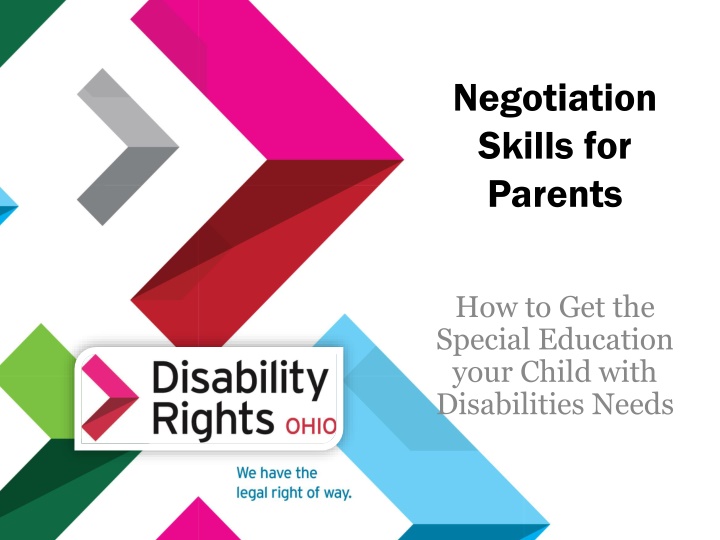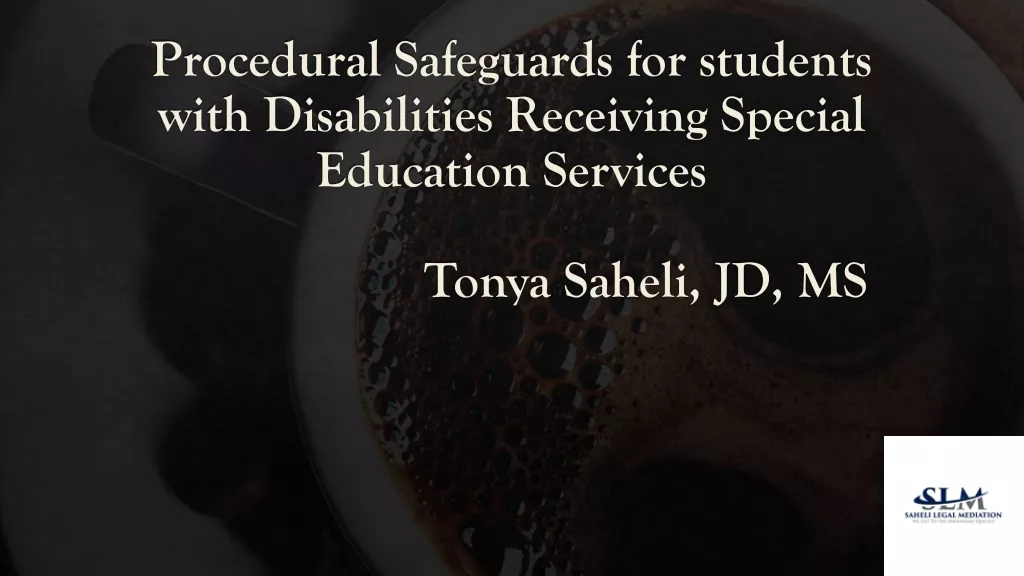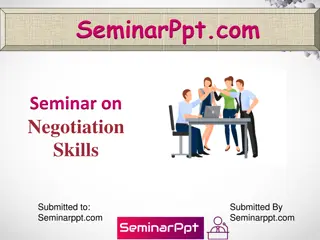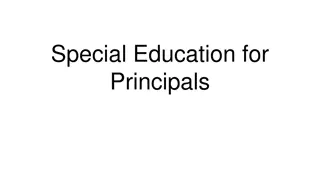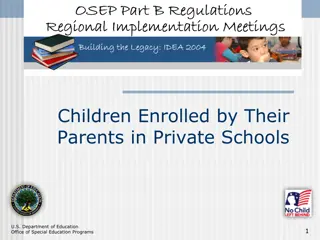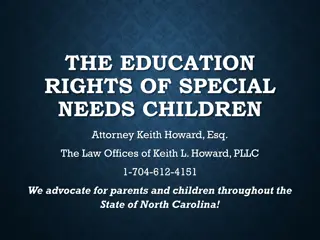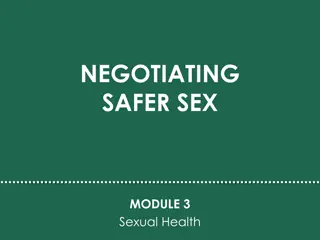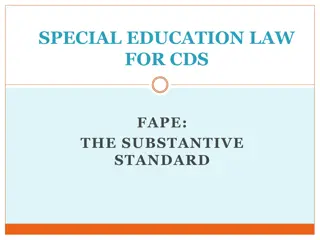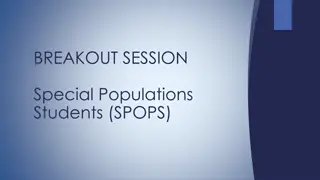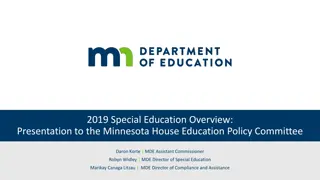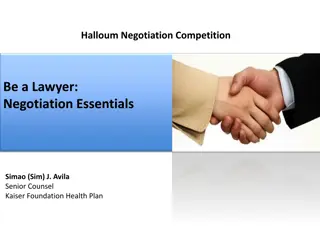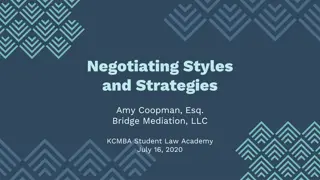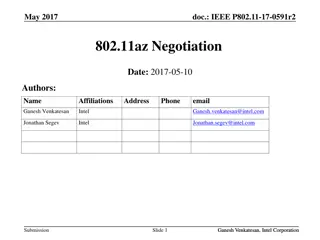Negotiation Skills for Parents: Ensuring Special Education for Children with Disabilities
Learn valuable negotiation skills as a parent advocating for your child's special education needs through the guidance of Disability Rights Ohio. Discover how to effectively communicate, prepare for meetings, identify barriers, and craft solutions to ensure your child receives the education they deserve.
Download Presentation

Please find below an Image/Link to download the presentation.
The content on the website is provided AS IS for your information and personal use only. It may not be sold, licensed, or shared on other websites without obtaining consent from the author.If you encounter any issues during the download, it is possible that the publisher has removed the file from their server.
You are allowed to download the files provided on this website for personal or commercial use, subject to the condition that they are used lawfully. All files are the property of their respective owners.
The content on the website is provided AS IS for your information and personal use only. It may not be sold, licensed, or shared on other websites without obtaining consent from the author.
E N D
Presentation Transcript
Negotiation Skills for Parents How to Get the Special Education your Child with Disabilities Needs
Who we are Disability Rights Ohio (DRO) is a non- profit corporation Ohio s designated Protection and Advocacy System and Client Assistance Program To advocate for the human, civil and legal rights of people with disabilities in Ohio
Contact information Disability Rights Ohio 200 Civic Center Dr., Suite 300 Columbus, Ohio 43215 614-466-7264 1-800-282-9181 www.disabilityrightsohio.org
Presenters John Price, Attorney jprice@disabilityrightsohio.org Kristin Hildebrant, Senior Attorney khildebrant@disabilityrightsohio.org Alison McKay, Attorney amckay@disabilityrightsohio.org
The Booklet A publication of Disability Rights Ohio, available at: http://www.disabilityrightsohio.org/negot iation-skills-for-parents
What well cover Getting prepared Effective communication Getting good results at meetings Identifying barriers to success Responding to problems Remedies
Getting prepared Being prepared is important at any stage of the special education process. Prepared parents are more likely to get what they want. The school will take you more seriously if you have identified the problem and have a proposed solution.
Getting prepared We will review the 4 steps to preparing to negotiate: Identify the problem Identify a resolution (what you want) Communicate with the right person Determine who has the information you need
Identify the problem/solution Clearly define the problem from the perspective of both sides Identify possible solutions-there are almost always more than one A consensus solution is usually easier to implement and more likely to be effective
Communicate with the right person Find the person who has the authority to fix the problem Find a person with whom you have established a good relationship Ensure that there will be follow up to your request and compliance with timelines for resolution
Communicate with the right person Teacher: classroom based information Principal: building level information Special education administrator: district- wide information Superintendent: ultimate decision-maker
Effective communication Resolve problems at the lowest level Work your way up the chain if you don t get results Ask people how they prefer to communicate Consider establishing a method of regular communication
Effective communication Personal contact Know when to use it Establish rapport with staff so that personal communication is more effective Allows you to gauge a person s reaction to your request through body language, and demeanor
Effective communication Telephone contact Can be effective if the issue to resolve is simple Useful if time is limited and you don t have time to write a letter
Effective communication Written communication Good for making specific requests when you need to establish a record and timeline May make it more likely a response will be received Look for sample letters if you need a template
Effective communication Document all communications Keep a notebook or other written log of discussions including date, person, subject, and summary of discussion Keep a copy of all correspondence sent or received
Effective communication Don t communicate when you are angry Take time to cool off before making a phone call, writing an email, or sending a letter Angry communications can be used against the writer
Effective meetings Being prepared is the best way to get good results at meetings You should: Know the strength of your position Understand the law/standards that apply Know what you want Know the strength of your team Think outside the box
Effective meetings Know the strength of your position Seek the assistance of an expert Have the expert participate in your meeting, if possible Seek an expert at the school s expense if appropriate
Effective meetings Know the legal standards that apply Advocate for what your child is entitled to under the law Use the appropriate language Understand and use the correct standard for special education, related services and other services available under the law
Effective meetings Know what you want Determine what you want before the meeting Draft a proposal to share with the team, if appropriate Know what you can give up and what is a deal breaker Be prepared to support your request with research/experts/law
Effective meetings Prepare for the meeting Understand the purpose of the meeting Ensure the necessary people will be in attendance Request notice from school about its position on your request Create an outline/agenda/bullet points of your requests (may be provide to team before meeting if appropriate)
Effective meetings At the meeting Stay on track by following the outline Focus on current issues, not the past Stay away from yes or no questions Stay calm Document any agreements/changes
Effective meetings After the meeting Ensure that the IEP reflects any agreements/changes Thank people Follow-up periodically to ensure that there is follow through
Troubleshooting Keep the focus on your child Recording meetings Comparing your child to other children Insufficient time for a meeting Union issues Budget issues Talking about the past Attorneys at meetings Meeting location
More formal options Know when more formal action is needed Know your options Try to start with the least formal option Seek the support of an advocate Understand the risks and benefits
